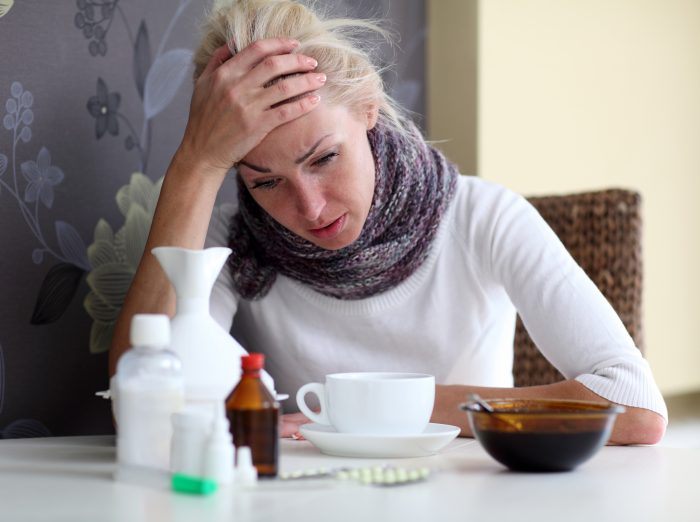20 years ago, very few people talked about inflammation, and today, it’s everywhere you look in the health world. Part of this is due to the toxicity of our diets and lifestyles (more on that below), part of it is because we are becoming more educated on what inflammation actually is and what causes inflammation, and part of it is that inflammation-related disorders are steadily on the rise. Regardless of the reason, inflammation is an important topic for anyone concerned with maintaining a healthy lifestyle, so listen up if you’ve ever asked, “what is inflammation, anyway?” Today, I will discuss what inflammation is, why it matters, and what you can do to protect yourself. (If you want to work on reducing YOUR inflammation, my step-by-step process is laid out for you in my Revitalize Health Accelerator!)
What is inflammation?
There are two main categories of inflammation: acute and chronic. Acute inflammation is your body’s way of repairing itself. Basically, your immune system is activated, releasing white blood cells to the troubled area and clearing out damaged cells. If you sprain your ankle, you’ll notice redness and swelling, which is an accumulation of blood carrying extra white blood cells to the injured area. This helps promote recovery and gets you back on your feet more quickly. Similarly, when you have pneumonia or a simple cold, your immune system is triggered, and you often feel fatigued, phlegmy, and puffy as you’re recovering. Again, this is inflammation in your body doing its job. So we need acute inflammation to stay healthy.
Chronic inflammation, on the other hand, is when inflammation elevates beyond the normal, helpful level, and turns systemic (meaning it spreads all throughout the body). This type of inflammation is caused when toxins get into our bodies from smoking, breathing polluted air, eating inflammatory foods (more below!), and accumulate over a long period of time. It can also be caused when acute inflammation isn’t resolved appropriately, or can be caused by an autoimmune disorder.
Why does inflammation matter?
Inflammation matters for three reasons: it causes frustrating symptoms, it can exacerbate current inflammatory conditions, and it can cause chronic disease.
If you have chronic inflammation, you may feel tired and fatigued all the time, or may have unexplained and chronic brain fog. You may also have digestive issues like gas, bloating, diarrhea, and constipation, because leaky gut is an inflammatory condition that causes all of these symptoms. You may experience puffiness in your face, hands, or feet, may get an unexplained rash, may be carrying extra fat around your belly. While all of these symptoms could be caused by other things, too, they can be telltale signs of inflammation, and no one wants to deal with them!
Inflammation from food and lifestyle can also make many inflammation-based conditions worse. Inflammatory bowel diseases like Crohn’s and ulcerative colitis happen when inflammation is heightened, which damages the intestine lining and lets things into the bloodstream that should be kept in the intestines. This leads to more inflammation, and a vicious cycle (often called a “flare”) starts. Autoimmune conditions (like lupus, rheumatoid arthritis, psoriasis, type 1 diabetes, Hashimoto’s thyroiditis, and multiple sclerosis) are all linked to inflammation in some way, and increasing inflammation through food and lifestyle usually makes symptoms of these conditions worse. Even migraines are linked to higher levels of chronic inflammation.![]()
Finally, a build-up of chronic inflammation over time has been linked to some significant chronic diseases. Although this should be obvious, I want to make it abundantly clear that one Twinkie or one McDonald’s Big Mac will not lead to these chronic conditions. But buildup of inflammation over time in bodies that are not adept at clearing inflammation is thought to contribute to causing these diseases. Chronic disease is directly linked to atherosclerosis and heart disease, Alzheimer’s, obesity, type 2 diabetes, and even cancer.
If you think you have high inflammation, you can ask your doctor for a high sensitivity C-reactive protein (“hsCRP”) test, or you can order your own at-home test via Everlywell (see this post for a discount code).
What can I do to protect myself from chronic inflammation?
The great news is that you can do a lot to protect yourself from chronic inflammation! An anti-inflammatory diet is my first recommendation, because it is the most surefire way to reduce digestive inflammation, which often turns into systemic inflammation. This means loading up on vegetables (particularly dark-colored vegetables and leafy greens) and healthy fats like fish, avocado, and high-quality oils. There are some “superfoods” touted as being especially anti-inflammatory (think: goji berries or bone broth), and while those are certainly healthy, I think you’re covered if you’re getting plenty of healthy fat and eating an abundance of vegetables daily. Remember, I recommend 8-12 servings per day!
An anti-inflammatory diet not only increases vegetables and healthy fats, but also decreases inflammatory foods like added sugar, processed foods with preservatives and other chemical ingredients, poor quality fats, and gluten and dairy (which are inflammatory for most people).
Food allergies and food intolerances also contribute to inflammation, so if you think you have food intolerances, check out this post.
In addition to diet, I recommend trying to “clean up” your environment, which means using more natural, less-chemical-filled versions of home cleaners and beauty / hygiene products, and breathing filtered air and drinking filtered water when possible.
Supplementing with anti-inflammatory herbs like turmeric (I take this one daily) and ginger can also be helpful. Reducing stress, especially through mind-body therapies like meditation (a critical part of my morning routine!), and getting adequate, high-quality sleep all help your body clear inflammation more effectively.
You don’t need to overthink this, and you certainly don’t need to beat yourself up for using a “standard” lotion or dish soap. Take it step by step, sleep well, eat an abundance of vegetables, do your best to reduce processed food and added sugar, and do what you can every day to prioritize your body and your health. Your body thanks you!
Need some help with an anti-inflammatory lifestyle?
My 10-Day Reset programs are designed to help people clear out inflammation and reset cravings! The only way to get access to the 10-Day Reset is through the Revitalize Health Accelerator, my all-encompassing wellness program designed to make you feel empowered, energized, and confident in your body – inside and out! Check out more on Revitalize here!
Now it’s your turn … What is most surprising to you about inflammation? What did you learn from this post? What’s your best anti-inflammatory habit?


Thanks a lot for sharing, Megan! I’m surprised to see how brilliant and precise the laws of nature are. It sends a message to you as soon as you start damaging your body with poor nutrition and lifestyle choices. And inflammation serves as a mean of this “lecture”.
Speaking about veggies and their anti-inflammatory potential, I love onions and garlic!
For those with a sweet tooth, using raw honey and cinnamon instead of refined sugar is a great way to reduce inflammation.
Best wishes and keep it up!
Great post, Megan! I always feel a huge difference in bloating and puffiness when I don’t get my 8 – 12 servings of veggies in.
You and me both, Carol! Thanks for reading!